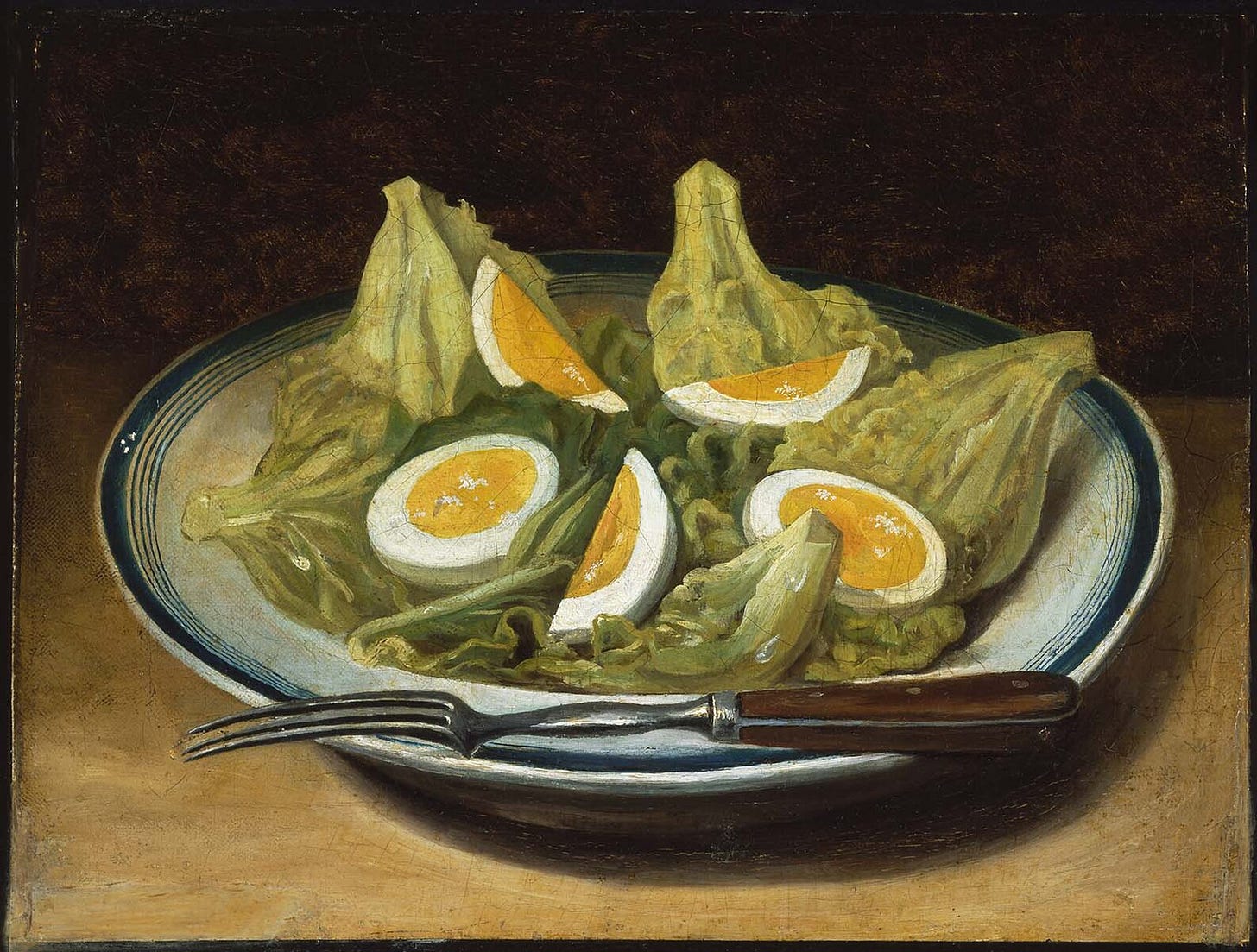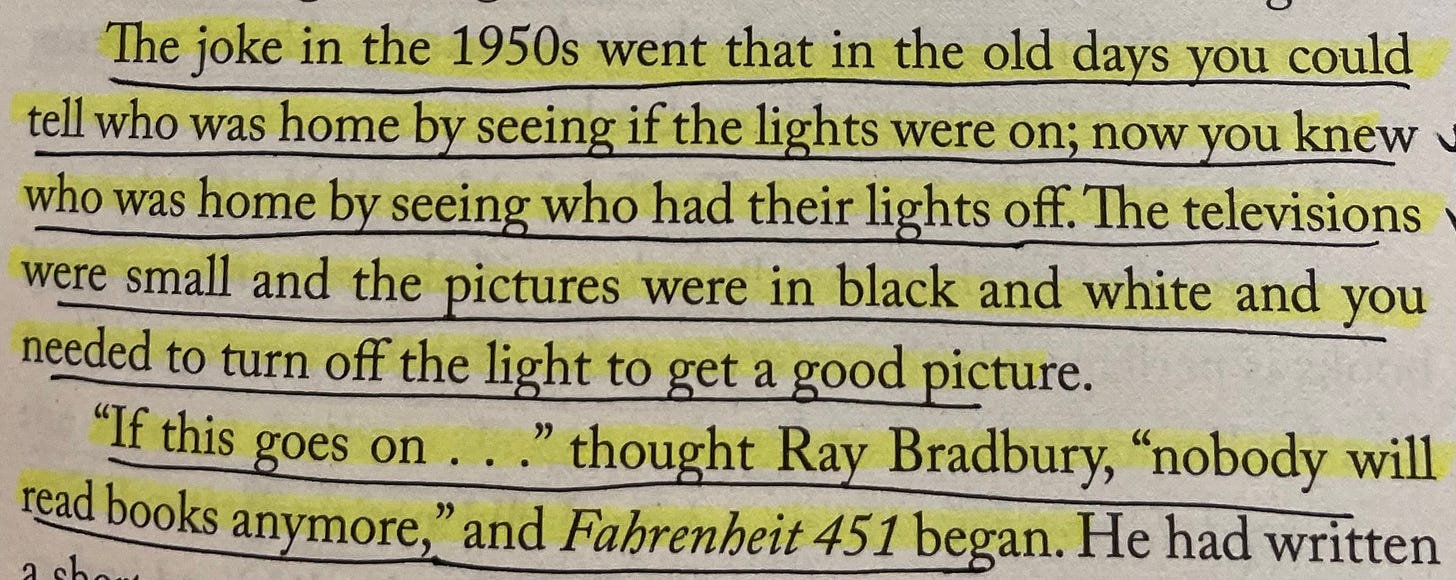Yesterday, my doctor told me to eat McDonald’s every day. He also told me to stop eating salad. It felt like opposite day.
It reminded me of what my old boss asked me: “Wow, are you reading? I never see anyone do that anymore.” It made me think of of when I heard a college kid say, “I don’t read books.”
Reading books is becoming more rare. What’s going on?
Salad

Books are like salad. Compared to other options, they’re beyond boring.
Spinach, carrots, grilled chicken, olive oil. That’s not very appetizing. But what about that sizzling beef and melting cheese on that Big Mac with a side of crispy golden fries and ice-cold Dr. Pepper? Oh yeah.
Why read a 500 page book about Benjamin Franklin when I can learn a life hack on TikTok? Why drag that bulky biography with me when my phone can tag along in my front pocket? [1]
Like McDonald’s, it’s quicker, easier, and damn delicious.
But even an M.D. doesn’t have to tell us that we should eat more salad than fast food. I know I probably shouldn’t be eating here, but it’s so good! I love it. I know I should eat healthier. It’s better for me.
There’s a tradeoff: short term pleasure for long term pain. We all know this. Yet many Americans look more like a Sumo wrestler than a Chris Hemsworth.
There’s a hidden epidemic across the world. I call it mental obesity.
Mental obesity is what happens when you overconsume junk food for the mind. TikTok, Youtube, Netflix, Twitter, Instagram, and other short-term media and news.
Its symptoms are undercover because they’re modern-day norms. Things like not being able to focus on a book for five minutes, or realizing you spent eight hours on your phone today. [2]
Just like the fat person who can barely tolerate the bland salad, more people are unable to tolerate the perceived blandness of books. For the mentally obese, reading feels like waterboarding: torturous and not appetizing.
But when I eat salad, I usually discover a strawberry or an almond nested under a spinach leaf. After a little while, I’m like, Oh, this actually isn’t too bad!
When you read, you discover intellectual strawberries. Chunks of nourishment. A story, insight, or idea that permanently changes the way you see the world. Oh this isn’t too bad either. It was harder to get here, but I’m glad I said no to Netflix.
Then over time, you’ll start to crave the strawberries instead of the fries. Your tastebuds evolve. You look back and think, how did I even eat McDonald’s in the first place? That was so greasy and too salty. [3]
Most social media and TV are McDonald’s for the mind.
But books are salad for the mind.
Sexy Options
It feels like a sacrifice to read because there’s so many other sexy options.
It’s like living in walking distance of 15 drive-thrus. McDonald’s, Wendy’s, In N’ Out, KFC, Chick-Fil-A, and more under construction. It’s a little too seductive.
In 2010, Paul Graham wrote that with more technological progress, there will be more things we don’t want to want. Things we like a little too much, like Big Macs or TikTok:
“More things we like will mean more things we have to be careful about.”
In 2020, I liked TikTok too much. I set screen limits for 90 minutes but would shatter them every day. Like McDonald’s, I knew I shouldn’t have been consuming it. I probably shouldn’t be spending three hours a day on TikTok. I could be doing something better with my time.
If I projected that onto my entire twenties, I would’ve spent nearly 11,000 hours on TikTok. That’s over 458 full days of my life. It was free for me to download, but it would have costed me 1.25 years of my life. [4]
So like being neighbors with a McDonald’s, I switched up my environment. I deleted TikTok so I could spend my time better. But when I picked up a book, I was fidgety. I couldn’t concentrate. My mind wanted something short and punchy and stimulating. I was in TikTok withdrawal.
Mental Fat Loss
Like eating more salad, my tastebuds for books took a few weeks to adjust. I tried reading “hacks” like chewing gum or using a white notecard to reveal one line at a time. These didn’t work. And I still had the instinct to check my phone, like I was missing something. I wasn’t.
The only way I made progress was by treating it like a video game. 10 minutes of reading. 20 minutes. 30 minutes. One hour. The only rule was having zero interruptions and putting my phone on airplane mode. It felt like that first Stairmaster session after Christmas break. It was hard work.
With more drive-thrus in the physical and digital world, “we’ll increasingly be defined by what we say no to,” Graham wrote. In a world with more things we “love,” it’ll also be more useful to follow this framework:
“If you have two choices to make, and they’re relatively equal choices, take the path more difficult and more painful in the short term.” - Naval Ravikant
Or as Jerzy Gregorek put it:
“Hard choices, easy life. Easy choices, hard life.”
The mentally fit people are the ones who do the rarest thing in the world: read books. They understand the sacred sacrifice of fueling the mind. They understand that reading Isaacson’s 500-page biography of Benjamin Franklin is worth the healthy variety of intellectual fruits and vegetables.
The doctor will never say, “eat more McDonald’s than salad.” So why should we treat our information consumption any different?
Notes
[1] “Learning” on TikTok or Reels isn’t really learning. Do you read four books at once and hop from one sentence in one book to another sentence in a different book? I guess you can learn on Youtube. But what I’m pointing towards is the lowest demand in history for physical books.
[2] You might think I’m a hypocrite because I use Twitter. Good point. But I don’t have it on my phone and routinely check it for 10-20 minutes on my MacBook. Also, a funny trend in human nature is that we’re all hypocrites. Al Capone thought he was a good person.
As for my comment on screens, most people work on a computer, so I’m excluding this. I’m referring more to social media, news, and TV that have replaced hobbies. It’s strange how spending three hours on TikTok has become “normal.” This reminded me of a quote from The Almanack of Naval Ravikant:
“When everyone is sick, we no longer consider it a disease.”
If you’re wondering, my doctor never prescribed McDonald’s. That’s the only piece of fiction in this essay. In the future, I’ll explore other symptoms I’ve observed in the mentally obese.
[3] It’s true: your tastebuds can change. They turnover every 10 days. McDonald’s actually tastes bad for me. I had coronavirus in 2021 and lost my taste and smell for a few months. I used that as an opportunity to eat healthier food and reprogram my tastebuds.
You can do the same for both food and books. But for the latter, taste is a metaphor for attention span, which is something you can train. Read my past post on Deep Work to learn more about improving your concentration.
[4] The best piece of advice I got this year: at 21, I’m a time billionaire. But from all this enticing junk food for the mind, I could easily squander a large chunk of my time net worth. If I was worth one billion dollars and lived to the age of 100, I would’ve pissed away 12.5 million dollars. And assuming the 10,000 hour rule was true, I could have used all that time to become a master of a craft.
If you read this far, you’re my type of person!
To get my writing in your inbox the second it comes out, subscribe:
Tremendous Thanks to
, , , , , and for helping me write this.Also wanted to shoutout my friend
for taking a second look at this piece on Thanksgiving. Check out his writing here: .


The books ARE the sexy option.
So weird/funny that chewing gum is a hack for reading books??? 😅
I love that you mentioned TikTok withdrawals. The chemical response in the brain to the constant dopamine hits is addictive. We literally train ourselves to be distracted and unfocused. Good work my man.